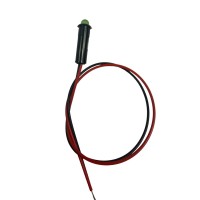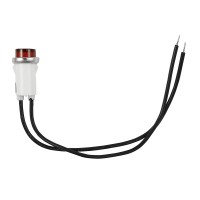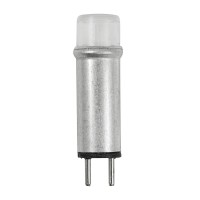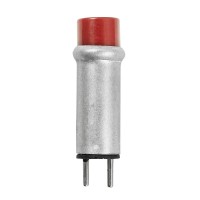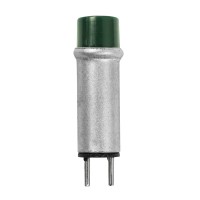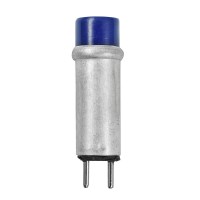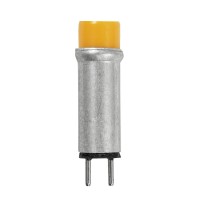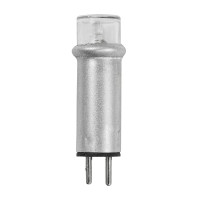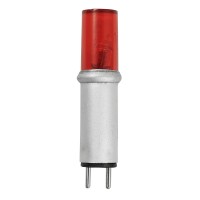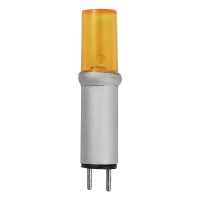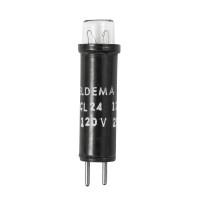Indicator Lamps
Indicator lamps are miniature bulbs designed to provide visual indication in control panels, dashboards, appliances, equipment, and machinery, alerting operators to operational status, warnings, or conditions requiring attention. These bulbs aren't about illuminating spaces – they're about communication, providing at-a-glance information about whether equipment is on or off, operating normally or experiencing problems, or requiring operator action. The reliability, visibility, and long life of indicator lamps directly impact equipment usability and safety.
The applications are remarkably diverse: industrial control panels with rows of indicators showing system status, appliance pilot lights confirming operation (oven preheated, refrigerator running, dishwasher in cycle), automotive dashboard warning lights and telltales, audio/video equipment power indicators, laboratory and medical equipment status displays, telecommunications equipment, and countless other situations where visual indication is necessary. Each application has specific requirements for brightness, color, voltage, size, and base configuration.
Voltage specifications vary widely because indicator lamps must match the electrical systems they're integrated into. Common voltages include 6V, 12V, 24V, 28V, 48V, 110V, 120V, 130V, and various others. Using incorrect voltage causes problems: too low voltage produces dim indication that's difficult to see, too high voltage burns out the bulb immediately or drastically shortens life. Many indicator lamps are available in multiple voltage ratings within the same physical size and base configuration, making voltage verification critical when ordering replacements.
Base types include bayonet bases (BA9s, BA15s, BA15d) for secure mounting in sockets with twist-lock action, miniature screw bases (E10, E12) for threaded sockets, wedge bases for push-in sockets, midget flanged bases for panel mounting, wire terminals for direct soldering, and various specialized bases for specific equipment manufacturers. The base configuration determines how the indicator mounts in its panel or socket, and compatibility is essential – the correct voltage bulb with the wrong base simply won't install.
Color is often integral to indicator lamp function. Clear bulbs produce white light that can be colored by external lens covers or filters. Colored glass bulbs (red, green, yellow, blue, amber) produce colored light directly from the bulb, ensuring consistent color indication regardless of lens conditions. Red typically indicates warnings, problems, or off conditions. Green indicates normal operation, ready states, or on conditions. Yellow/amber indicates caution or intermediate states. Blue is used for special indications. The color coding follows convention but isn't universal – always verify indicator meaning rather than assuming colors.
LED indicator lamps have become increasingly common as alternatives to incandescent indicators, offering advantages that are particularly valuable in indicator applications. LEDs last 50,000-100,000 hours or more, virtually eliminating replacement in equipment that might have limited access or where indicator failure creates safety concerns. LEDs draw minimal current (often 20-50mA versus 150-300mA for incandescent), reducing electrical load and heat generation. LEDs provide instant-on indication without the brief warm-up that incandescent bulbs exhibit. However, LED indicators require proper voltage regulation and current limiting, making direct replacement more complex than incandescent in some applications.
Lifespan considerations differ by application. In equipment operating 24/7, an indicator lamp burning continuously accumulates 8,760 hours annually – a 1,000-hour incandescent bulb would fail roughly every 6 weeks. This makes long-life incandescent indicators (rated for 5,000-10,000 hours) or LED indicators essential in continuous-operation equipment. In equipment operating intermittently, even basic indicator lamps may last years. Understanding operating hours helps select appropriate lamp types and plan preventive replacement schedules.
Common Base Types: BA9s bayonet, BA15s bayonet, E10 miniature screw, wedge base, midget flanged, wire terminals, various specialty bases
Voltage Ranges: 6V, 12V, 14V, 24V, 28V, 48V, 110V, 120V, 130V, and various others matching equipment electrical systems
Color Options: Clear (white light), red, green, yellow, amber, blue, various specialty colors
Applications: Industrial control panels, appliance indicators, automotive dashboard, medical equipment, telecommunications, laboratory equipment, audio/video gear, machinery status displays
5100H5-12V Panel Mount Indicator 1/4 Inch Green LED 12V
1/4 Inch Panel Mount Indicator LED Green 5mm LED12 Volt, Green Diffused LED -- 9 Inch Wire..
$5.95
5100H5-24V Panel Mount Indicator 1/4 Inch Green LED 24V
1/4 Inch Panel Mount Indicator LED Green 5mm LED24 Volt, Green Diffused LED -- 9 Inch Wire..
$5.95
1090C1-12V
Voltage: 12V, Current: 80mA, Type: Non-Relampable Indicator, Base Type: Insulated Wires, Life..
$4.99
CFB-28R
28V, 40mA, 2185 Internal Lamp, 25,000 Life Hours, Incandescent, Bi-Pin Base, Red
Contact for Price
CFB-28G
28V, 40mA, 2185 Internal Lamp, 25,000 Life Hours, Incandescent, Bi-Pin Base, Green
Contact for Price
CFB-120G
120V, 2mA, C2A/30K Internal Lamp, 25,000 Life Hours, Neon W/Resistor, Bi-Pin Base, Green
$4.75
CFB/L-120C
120V, 2ma, C2A/30K Internal Lamp, 25,000 Life Hours, Neon W/Resistor, Bi-Pin Base, Clear Long Lens
$4.75
CFB/L-120R
120V, 2mA, C2A/30K Internal Lamp, 25,000 Life Hours, Neon W/Resistor, Bi-Pin Base, Red Long Lens
$4.75
CFB/L-120A
120V, 2mA, C2A/30K Internal Lamp, 25,000 Life Hours, Neon W/Resistor, Bi-Pin Base, Amber Extended..
$4.75
120PC
120V, 0.025A, 2.0W, CC-7A Filament, 7,500 Life Hours, Cartridge Lamp, Use With 30096 Housing, 1.30..
Contact for Price

